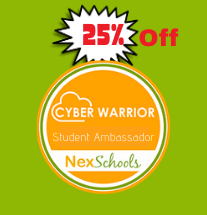In today's world we are connected digitally more than ever. We are bringing to you complete guide to protect yourself, your family's privacy and stay safer online.

ADVICE FOR INDIVIDUALS: OWN YOUR PRIVACY
Individuals feel an increasing lack of control over their personal data. However, there are steps you can take to learn about the types of data you’re generating online, and how it’s collected, shared and used. Follow these basic privacy tips to help you better manage your personal information and make informed decisions about who receives your data.
Get Involved with NexSchools Cyber Safety Awareness campaign - in making your schools, educational insitutions, yourself as student, parents, teachers and school heads Cyber Smart in 2020-20201 Academic year
Schools can get involved with NexSchools I SUPPORT CAMPAIGN
We are conducting workshop for:
Enjoy social media
Privacy for Teens
School Privacy Policy: Why & How
Calls to Action:
Personal info is like money
Value it. Protect it.
Personal information, such as your purchase history, IP address, or location, has tremendous value to businesses – just like money. Make informed decisions about whether or not to share your data with certain businesses by considering the amount of personal information they are asking for, and weighing it against the benefits you may receive in return.
Keep tabs on your apps
Many apps ask for access to personal information, such as your geographic location, contacts list and photo album, before you can use their services. Be thoughtful about who gets that information, and wary of apps that require access to information that is not required or relevant for the services they are offering. Delete unused apps on your internet-connect devices and keep others secure by performing updates.
Manage Your Privacy eSttings
Check the privacy and security settings on web services and apps and set them to your comfort level for information sharing. Each device, application or browser you use will have different features to limit how and with whom you share information.
According to a Pew Research Center study, 79% of U.S. adults report being concerned about the way their data is being used by companies. Respecting consumers’ privacy is a smart strategy for inspiring trust and enhancing reputation and growth in your business.
ADVICE FOR SCHOOLS: RESPECT PRIVACY
Calls to Action:
If you collect it, protect it.
Data breaches can not only lead to great financial loss, but a loss in reputation of schools and trust of parents. Follow reasonable security measures to keep your students’ and staff personal information safe from inappropriate and unauthorized access. Make sure the personal data you collect is processed in a fair manner and only collected for relevant and legitimate purposes.
Consider adopting a privacy framework. Build privacy into your school by researching and adopting a privacy framework to help you manage risk and create a culture of privacy in your organization.
Conduct an assessment of your data collection practices.
Understand which privacy laws and regulations apply to your business. Educate your students, teachers and employees of their and your organization’s obligations to protecting personal information.
Transparency builds trust
Be open and honest about how you collect, use and share consumers’ personal information. Think about how the consumer may expect their data to be used and design settings to protect their information by default. Communicate clearly and concisely to the public what privacy means to your organization and the steps you take to achieve and maintain privacy.
Maintain oversight of partners and vendors
If someone provides services on your behalf, you are also responsible for how they collect and use your consumers’ personal information
Create a culture of privacy in your school
Make sure your teachin staff and students are aware of their value of privacy. Holding a staff meeting or a lecture once a year isn’t sufficient. Communicate tips for protecting privacy on social media, on your company’s messenger platform, through emails and in posters around the school.

Registrations are open for all the age categories.
Avail Discount now available for middle schoolers only
Securing Key Accounts and Devices
Your online accounts and digital devices contain a lot of important information about you and your friends and family. These resources and tips will help you to better secure them and keep your data safe.
Storng Passwords
Typing a username and password to access a website or app isn’t the only way to identify yourself on the web services you use.
Lock down your login
Fortify your online accounts by enabling the strongest authentication tools available, such as biometrics, security keys or a unique on-time code through an app on your mobile device. Your usernames and passwords are not enough to protect key accounts like email, banking or social media.
Over time more websites will be adopting strong authentication.
Social Media
Have your family, friends and community follow these tips to safely enjoy social media.
Privacy and security settings exist for a reason
Learn about and use the privacy and security settings on social networks. They are there to help you control who sees what you post and manage your online experience in a positive way.
Once posted, always posted
Protect your reputation on social networks. What you post online stays online. Think twice before posting pictures you wouldn’t want your parents or future employers to see. Recent research found that 70 percent of job recruiters rejected candidates based on information they found online.
Your online reputation can be a good thing
Recent research also found that recruiters respond to a strong, positive personal brand online. So show your smarts, thoughtfulness and mastery of the environment.
Keep personal info personal
Be cautious about how much personal information you provide on social networking sites. The more information you post, the easier it may be for a hacker or someone else to use that information to steal your identity, access your data or commit other crimes such as stalking.
Know and manage your friends
Social networks can be used for a variety of purposes. Some of the fun is creating a large pool of friends from many aspects of your life. That doesn’t mean all friends are created equal. Use tools to manage the information you share with friends in different groups or even have multiple online pages. If you’re trying to create a public persona as a blogger or expert, create an open profile or a “fan” page that encourages broad participation and limits personal information. Use your personal profile to keep your real friends (the ones you know and trust) up to date with your daily life.
Be honest if you’re uncomfortable
If a friend posts something about you that makes you uncomfortable or seems inappropriate, let them know. Likewise, stay open minded if a friend approaches you because something you’ve posted makes him or her uncomfortable. People have different tolerances for how much the world knows about them respect those differences.
Know what action to take
If someone is harassing or threatening you, remove them from your friends list, block them and report them to the site administrator.
Keep security software current
Having the latest security software, web browser and operating system is the best defense against viruses, malware and other online threats.
Own your online presence
When applicable, set the privacy and security settings on websites to your comfort level for information sharing. It’s OK to limit how and with whom you share information.
Make your passphrase a sentence
A strong passphrase is a sentence that is at least 12 characters long. Focus on positive sentences or phrases that you like to think about and are easy to remember (for example, “I love country music.”). On many sites, you can even use spaces!
Unique account, unique passphrase
Having separate passphrases for every account helps to thwart cybercriminals. At a minimum, separate your work and personal accounts and make sure that your critical accounts have the strongest passphrases.
When in doubt, throw it out
Links in email, tweets, posts and online advertising are often how cybercriminals try to steal your personal information. Even if you know the source, if something looks suspicious, delete it.
Post only about others as you have them post about you.
The Golden Rule applies online as well.
Source: https://staysafeonline.org/ The National Cyber Security Alliance officially leads Data Privacy Day in North America. Data Privacy Day is an international effort held annually on Jan. 28 to empower individuals and educate businesses to respect privacy, safeguard data and enable trust.

Cyber Safety Initiatives by NexSchools
NexSchools celebrates Cybersecurity Awareness Month in October 2020
NexSchools Runs The Largest School Cyber Safety Awareness Campaign
NexSchools Becomes STOP. THINK. CONNECT. Partner
School Children Making A Difference With Blogs
Celebrating Success Stories Of Lil Bloggers
NexSchools Announces Successful Completion of Cyber Warrior Ambassador Certificate Course
